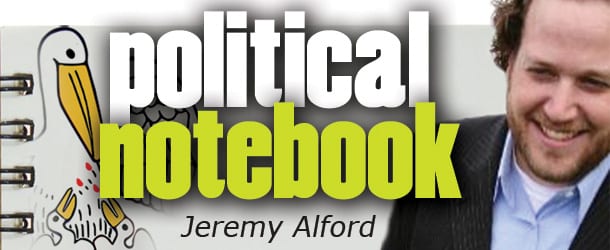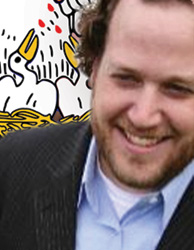While House and Senate leaders contend a proposed increase to the state gasoline tax still has a long road ahead in the ongoing regular session, supporters aren’t letting up on their push to generate more money for Louisiana’s overwhelming transportation needs.
Still, it’s not the kind of political assessment supporters want to hear as the session nears its adjournment on June 8.
Throwing the issue for a new curve was President Donald Trump, who told Bloomberg News he would “certainly consider” supporting a hike in the federal gas tax if the revenue were directed to infrastructure spending.
The federal retail gasoline tax is already 18.4 cents and on the state level the levy is 20 cents. Neither rate has been increased since the early 1990s.
Republican consultant Roy Fletcher of Baton Rouge said Trump’s statement, which stopped short of an endorsement or an announcement of any real plan, may introduce a new variable into the debate in the Louisiana Legislature.
Some conservatives might think Trump’s words of encouragement offer them some political cover to increase a tax that’s still seeking to gain footing at the Capitol. Fletcher said the possibility of gasoline being double-taxed is something to consider as well.
“If the feds possibly increase their rate — and we don’t know if that’s even the case — does someone want to do something here before that happens?” Fletcher asked. Or, he added, does it become an issue that’s worth putting on hold, at least temporarily?
Before Trump’s statement, the ongoing shotgun approach to increasing the state’s gas tax was looking tougher with each passing day.
Attention turned to getting at least one of the related bills out of the tax-writing Ways and Means Committee and onto the House floor. But little progress was made.
Many committee members believe that an increase upwards of 17 cents, as proposed in one measure, will be a challenging sell. Given that, other options are starting to appear on the table; these include the possibility of a different funding source, like a small portion of the state sales tax. But those options appear to be taking a back seat to the public discussion over the gasoline tax.
There have likewise been very informal discussions — talks that core supporters aren’t necessarily a part of — about fallback positions, such as making sure, at the very least, certain legislative elements of the various proposals out there stay intact; these elements include scaling back administrative costs; prioritizing projects; and indexing current and future revenue.
That said, none of the teams behind the push for an increased gas tax in Louisiana are throwing in the towel.
There are still rays of hope to be found on the issue, with supporters promising more outreach and education — a daunting task with less than half the session remaining.
There are also some hardcore politics at play. Some Republicans, with an eye to 2019, don’t want to give Gov. John Bel Edwards the benefit of having orange barrels all over the state’s highways when he runs for re-election.
Lawmakers Look At Prescription Drug Pricing
A set of bills moving through the state Legislature’s ongoing regular session would create new layers of disclosure in regard to prescription drug pricing in Louisiana.
The policy push has caught the attention of the Pharmaceutical Research and Manufacturers of America, which represents companies that research, develop and market medicines. They’re also companies that are being targeted by the drug pricing legislation.
As such, PhRMA has invested heavily in the session by hiring a squad of skilled lobbyists and attorneys. The team is voicing serious concerns about SB 59 by Senate Health and Welfare Chair Fred Mills, R-Parks, and HB 436 by House Insurance Chair Kirk Talbot, R-River Ridge.
The bills represent the top legislative priority — in terms of playing defense — for PhRMA in the state this year. Both of the bills, as originally introduced, would require that average wholesale drug prices be disclosed to prescribing physicians and others. Opponents argue that it’s the prescription co-pay that really matters.
Talbot’s bill would subject violators to unfair trade practices. Mill’s proposal did the same, but amendments helped alleviate that concern for opponents.
Of the two, Talbot’s bill has a further reach; it calls for a Prescription Drug Review Committee to be created in the Insurance Dept. That committee would be charged with getting to the bottom of what’s driving the costs of prescriptions.
The bill would also place this “legislative finding” into law: “The Legislature of Louisiana hereby finds that the costs of prescription drugs have been increasing dramatically without any attributed reason.”
That’s a proposed finding that opponents are countering by offering lawmakers stacks of literature to the contrary.
“All we want to do is set up some level of transparency,” said Talbot.
Mills said he is working with a variety of stakeholders to sharpen the focus of his SB 59.
Opponents are urging the bill authors to instead take a closer look at what’s in place in Florida — a state-created website that details the top 300 drugs and their retail prices by county.
Some business interests share the same concerns as PhRMA in relation to the two bills, particularly when it comes to the addition of a new regulatory framework, which they argue could lead to unnecessary litigation.
Georges Now A Republican
New Orleans businessman John Georges is now — again — a Republican. That has state GOP leaders speculating, with many of them pleased to welcome the former candidate and his resources into the fold.
“I switched a couple of months ago,” Georges said in an interview recently. “It was for personal reasons, not political or business.”
He was actually a Republican for 29 years before his interest in public service prompted a run for governor as a non-affiliated candidate and a more recent bid for New Orleans mayor as a Democrat.
Georges, who orchestrated the landmark purchase of The Advocate newspaper, expanded his publishing footprint earlier this year. That’s when his company, Georges Media, acquired The St. Tammany Farmer, one of the state’s oldest newspapers.
Equal Pay On Shaky Ground
Despite the proposal being a part of Gov. John Bel Edwards’ official package, legislation to ban private companies from engaging in “pay secrecy” was soundly rejected by the House Committee on Labor and Industrial Relations.
HB 222 by Rep. Helena Moreno, D-New Orleans, would have prohibited employers from taking actions against employees for inquiring about, discussing or disclosing their wages or another employee’s wages. Up against conservative resistance, the bill failed in a 5-9 vote.
The governor’s drive on equal pay, though, found a second life the same afternoon when the Senate Labor and Industrial Relations Committee advanced a somewhat related proposal. SB 2 by Sen. JP Morrell, D-New Orleans, represents a much deeper dive into the issue; it is supported by Edwards.
The legislation expands the Louisiana Equal Pay Act to include men and a number of different employer groups, like local governments and associations. It likewise provides guidelines for related lawsuits.
Before her legislative loss, Moreno received support from a number of speakers, including Rep. Julie Stokes, R-Kenner, who said she did not originally believe a state wage gap existed. But after three years of listening to testimony on the subject, her mind was changed.
“I realized it wasn’t just some way to get us to do something to harm business,” Stokes said, adding, “People who are running payroll, they’ve told me, ‘It’s real.’”
Representatives from the Louisiana Assoc. of Business and Industry and the National Federation of Independent Business both argued that there are already federal and state laws that address the objectives of Moreno’s bill. It was a line of attack echoed by many of the conservative members of the House committee.
If Morrell is successful on the Senate side, where similar measures have been advanced in the past, he will still have to face off against the House’s labor committee, which has a history of shooting down such bills.
Political History: A Governor In A Duel
June 8 will mark the 210th anniversary of Louisiana’s very first governor taking a bullet to the thigh during a high-profile duel.
That’s right. A duel.
Back before jabs were delivered on social media and countered with letters to the editor, early Louisiana politicians had the option of dueling with their enemies — using guns.
Clearly Gov. William C.C. Claiborne wasn’t quick enough on the draw against Daniel Clark, who had hoped he would become the first governor after Louisiana was transferred from France to the United States.
Clark was the loudest voice of opposition at the time against Claiborne’s policies, and he literally pulled the trigger to get his point across.
In the wake of the duel, Clark entered old age in New Orleans, his career in politics ruined. He died suddenly from a fever on Aug. 16, 1813. But his legacy lived on for many years thanks to a case that’s still being studied today.
Clark’s estate was locked up in the courts for the six decades after the duel due to a daughter who claimed she was the legitimate heir through a secret marriage.
The case uncovered unknown details about a “true-life romance,” according to legal documents. A U.S. Supreme Court justice who participated in the vast majority of the proceedings called it the “most remarkable case” ever brought before the court.
Corporate Tax Overhaul Pushed Ahead
Legislation intended to lower the corporate income tax rate failed to get a full hearing before the House Ways and Means Committee because its author asked for more time to tweak the proposal.
Rep. Kenny Havard, R-St. Francisville, said his HB 648 was incomplete as drafted and that the amendments he needed to get the legislation into the right posture were still being put together. He added that his goal was to get back in front of the committee soon with the finalized measure.
With his legislation, Havard wants to lower the top corporate rate of 8 percent, which he called the “highest in the nation,” and move the state toward a flat tax. Havard is calling his concept the “Business Flat Tax.” He told committee members that it would not apply to sub-chapter S-Corps or limited liability companies.
The idea came under fire by Stephen Waguespack, president of the Louisiana Assoc. of Business and Industry, who called it the “governor’s backup plan.” It was a clear reference to Gov. John Bel Edwards’ failed commercial activity tax on gross receipts.
Havard’s bill deals instead with gross margins. “It will apply to profit and not receipts, making it completely different from the governor’s plan, or the CAT tax,” said Havard.
He added that the legislation, once properly amended, would eliminate loopholes and remove or reduce certain tax credits and exemptions. If certain financial triggers are met, under Havard’s plan, even the franchise tax would be rolled back completely.
Havard offered an overall mission for the legislation: “That all of our profitable corporate taxpayers pay at least a little something so that other companies and individuals don’t have to make up the difference.”
They Said It
“Go easy with the acronyms.”
— Sen. Dan Claitor, R-Baton Rouge, during a complicated discussion about operations at the Louisiana Dept. of Health
“That was really cool how that happened. Now the devil really is in the details.”
— Rep. Sam Jones, D-Franklin, on how one of his legislative proposals was assigned the infamous number of HB 666
For more Louisiana political news, visit www.LaPolitics.com or follow Jeremy Alford on Twitter @LaPoliticsNow.














Comments are closed.